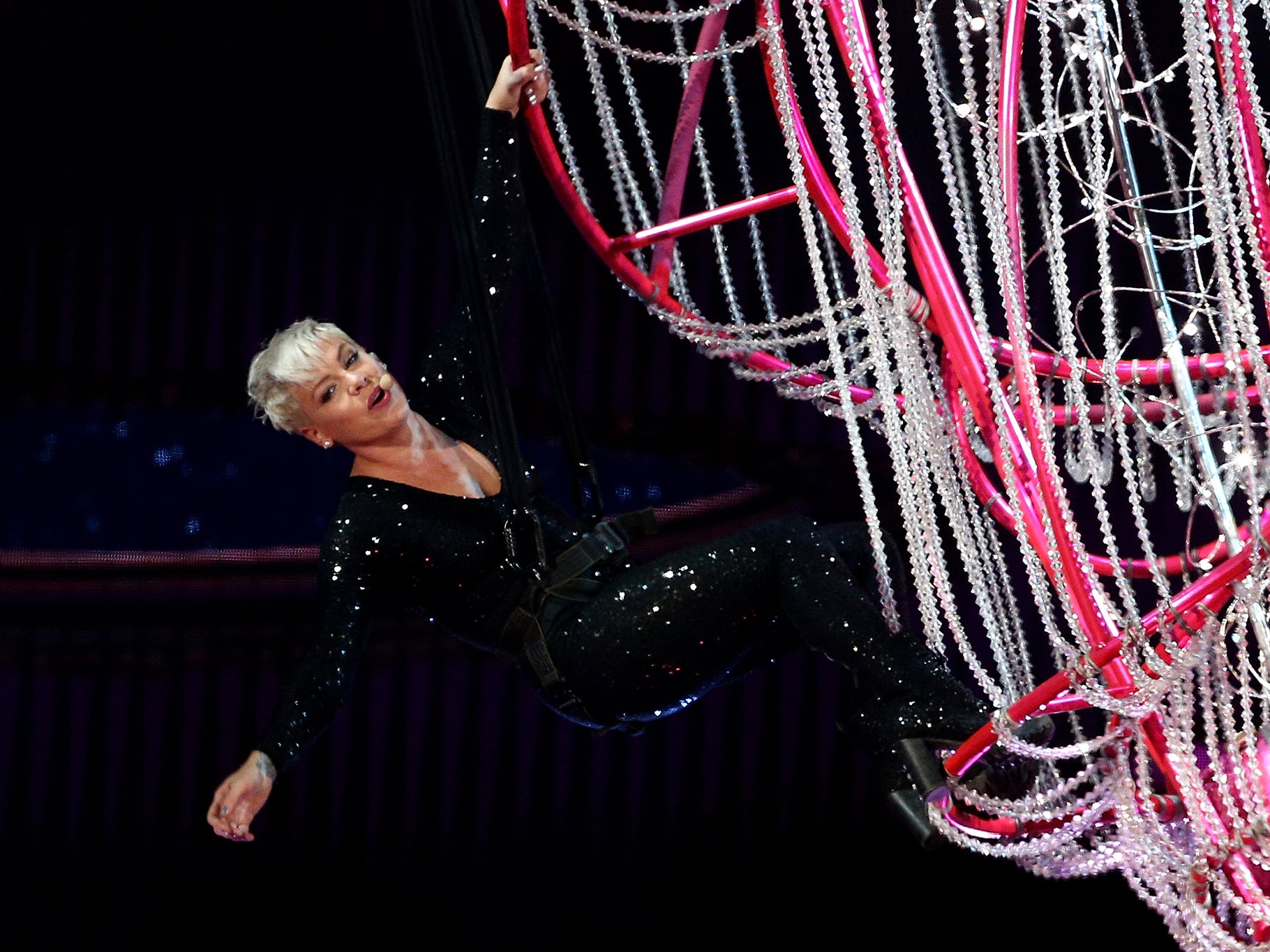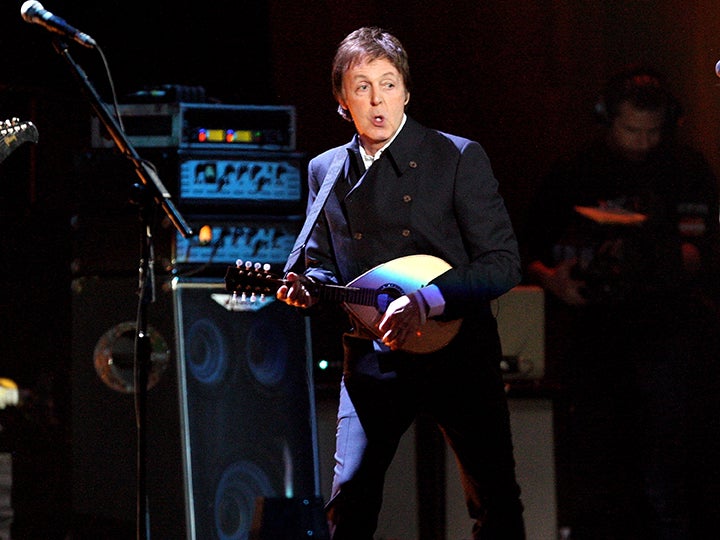Why the Brits should stick to honouring British artists
Extending the Outstanding Contribution in Music award to overseas artists implies the best musical talent can only be found outside the UK. Are not Pink Floyd and Radiohead worthy recipients? David Lister argues


At this year’s Brits, rock and pop music’s biggest night of the year had its climax with the presentation of the Outstanding Achievement in Music award, and a performance by the winner. For the first time in the history of the Brit Awards, the rules were changed to enable it to go to someone from outside Britain. The recipient was Pink, the American singer-songwriter with a dazzling live act.
No disrespect to Pink, well maybe a little, but are the Brit organisers really claiming that her contribution to music is greater than that of fellow Americans Joni Mitchell or Bob Dylan, or Neil Young, or Paul Simon?
Let’s be clear, Pink is a fabulous and fascinating artist with 90 million record sales and a stunningly athletic and acrobatic stage act. As Brits chairman, as well as chairman and CEO of Sony Music UK and Ireland, Jason Iley says: “Pink is a trailblazer, a phenomenally talented singer and songwriter, and truly one of the greatest artists of our time. With her remarkable career spanning nearly 20 years, Pink is one of the most successful artists in the world, consistently releasing multi-million-selling albums and selling out tours all over the globe.”
That’s all true. But has she honestly achieved so much that she takes pride of place ahead of any other American rockstar? Each of those other artists I have mentioned has over 50 years’ music-making to their name. Each is, to use a tired word “legendary” and each has been hailed many times for influencing countless other artists in younger generations. You’d be hard-pressed to find a female songwriter today who doesn’t name Joni Mitchell among her influences and inspirations.
And, your heart has to go out to Dylan. He can achieve what he must have thought was a pretty good accolade in winning the Nobel Prize in Literature. But you clearly have to go through considerably more hoops to get the Outstanding Contribution to Music Award at the Brits. Keep trying, Bob!
Eat your heart out too, Madonna. She’s been no slouch over the years in making a name for herself. But she, too, must now be wondering how to become an icon in the eyes of the Brits committee. Then there’s Diana Ross and Debbie Harry and… well we could all make our own list of outstanding American “contributors”.
In fact, there is a catalogue of perplexing decisions in this key, supposedly supreme, award. In the long history of the Brits, it has gone through several changes of name, Lifetime Achievement, Outstanding Achievement, Icons Award, and now Outstanding Contribution to Music. Perhaps they dropped the word “achievement” because, to judge from the Brits official website, they have some difficulty in spelling it.
But whatever the name, and whatever the spelling, it has been characterised by some dreadful omissions – omissions that demonstrate a woeful neglect of hugely important artists who have genuinely shaped the history of British music.
And the reason for that is an underestimation of music fans, and a patronising belief that some of music’s genuine icons are either unknown to them, or too complex for them to appreciate.
It goes without saying that there have been many, many worthy and indeed essential winners: The Beatles, The Who, Sir Elton John, David Bowie, Queen, Fleetwood Mac, the Bee Gees, Spice Girls, Paul McCartney, Oasis, Blur and, just last year, Robbie Williams. Few would argue with those choices. One can even forgive the Brits committee’s hazy acquaintance with geography in crowning U2 with the award, long before the award officially recognised overseas artists.

But oh the dismal lack of recognition for so many British artists and bands, who manifestly deserved that recognition. If one thinks of British music, then surely one of the most, if not the most, quintessentially English songwriter of the last half century and more is Ray Davies of The Kinks. But the writer of “Waterloo Sunset” and so many other songs celebrating British life has never received the honour, either for himself or for The Kinks, one of the defining bands of the Sixties.
I was so incensed by this that I once took it up with an extremely senior member of the Brits hierarchy. I was told that one of the crucial factors taken into account when deciding on the award is to pick an artist or band that will suit the ITV prime-time audience. The Brit Awards are normally broadcast on ITV.
Ideally the winner should be available on the night to close the show. Some (though not all) of the American artists I mentioned earlier would not be, that should not preclude them being honoured. Indeed, Freddie Mercury was the winner of the award a year after his death.
More puzzlingly, the patronising view of what a television audience would like doesn’t stand up to scrutiny.
Would a medley of The Kinks’ greatest hits performed by Davies, who still tours, really not excite an ITV prime-time audience? I am absolutely certain that it would. And the songs wouldn’t exactly be unknown to them. How peculiar that the Brits people could possibly think otherwise.
Here’s another omission from the Outstanding Contribution to Music award. Jeff Lynne has never won. Yet, not only has his band the Electric Light Orchestra, later ELO, had a string of international hits since the Seventies. Not only are he and the band still selling out arenas on the latest world tour, not only was he co-founder of a genuine supergroup, Traveling Wilburys, alongside George Harrison, Bob Dylan, Roy Orbison and Tom Petty in the Eighties, but he is also an acclaimed producer, even to the extent of producing The Beatles when the survivors in the group released two of their earlier partly finished songs in the Nineties. As contributions go, I’d say Jeff Lynne’s is pretty outstanding.
For some remarkable omission there are possibly good reasons. At first sight it looks bizarre that The Rolling Stones haven’t won. But knowing Mick’s dislike of being seen as an establishment figure (give or take a knighthood) and more pertinently his dislike of receiving awards that imply his time his up and he is not still a musical mover and shaker, I strongly suspect that he has been offered the accolade and has turned it down on behalf of himself and the band.
But other bands have caused seismic shocks in British music, as well as earning the industry fortunes in exports, yet not won the award.
Pink Floyd are yet to win the top award. Radiohead are not just waiting for their lifetime achievement award from the Brits, they are waiting for a Brit award in any category. Pink Floyd and Radiohead... no great contribution to British music there!
Punk bands from The Sex Pistols to The Clash would clearly frighten the horses, as neither has won. The Smiths from a few years later have also been ignored, despite their musical and intellectual strengths.
Then there’s Led Zeppelin. They made quite a few waves in their day. But neither the band as an entity, nor singer Robert Plant nor guitarist Jimmy Page have apparently made sufficiently outstanding contributions.
Led Zeppelin has never really gone out of fashion. Other bands, huge in their day, admittedly have to some degree. One such is Dire Straits, but so big were they in the early Eighties, so huge their sales, so popular their music, that it would be fully appropriate for the band and its leader Mark Knopfler to be considered for the award.
It is probably invidious to pick one of the lifetime achievement award winners from across the years to make a contrast. All are no doubt worthy in their own way. But let’s be invidious. Is the contribution to music of Led Zeppelin or Radiohead or Pink Floyd really so much less than that of Duran Duran?
And moving beyond what one might think of as obvious contenders, is it too outrageous to suggest that the powers that be at the Brits could be unprecedentedly imaginative and choose someone who has contributed so much over half a century to British music, even if he is a million miles from being a staple of ITV prime time?
I refer to Richard Thompson, the musician’s musician, co-founder of Fairport Convention in the Sixties, and since then a relentless innovator and student of traditional English music, reinterpreting it, often to a melodic rock beat, just as his fairly Fairport founder Ashley Hutchings did over the years. Thompson is one of the unsung heroes of the evolution of British music, unsung that is by a mainstream audience, but worshipped not just by his own following but by fellow musicians.
Of course, giving him the Outstanding Contribution award would entail the Brits committee moving out of its comfort zone and giving a nod to what can loosely be termed folk music, a genre that it seems to automatically rule out when it comes to the top award.
Perhaps it is this lack of imagination, this lack of daring, this nervousness about offending the sensibilities of that ITV prime-time audience that has prompted the Brits committee to extend the award overseas. Perhaps their focus is so narrow and predictable that they have decided they have simply run out of outstanding British contributors for the time being.

But extending the award overseas is not necessarily a great idea. Certainly, it opens up a world of possibilities with the wealth of legendary American talent still, in many cases, performing. But the Brits committee should study the recent history of the Man Booker Prize for Fiction. And they should take note. That prize, too, ceased to be a purely British and Commonwealth affair a few years ago, and in 2013 extended the prize to American writers.
American writers duly hogged the shortlist, and there was resentment among British writers and publishers that the spotlight had been turned away from British talent. Five years later there was a public protest from the Folio Academy, which includes Margaret Atwood, Ian McEwan and Zadie Smith, about the ubiquity of American writers on the prize shortlist, contrasting that with most of the American literary prizes which were not so generous to the world, and tended to champion homegrown talent.
The Brits should be wary of implying that the best musical talent is to be found outside Britain. The Brits should, indeed, be true to its own name and have faith in British talent, seeing how we have led the world musically since the Sixties boom. Much better than opening up the award to overseas artists would be to explore, and showcase to a huge national TV audience, some of those artists who have done so much to shape British music but have had so little prime-time exposure.
There is still a wealth of British talent, some of it relatively recent, some of it stretching back more than half a century, that deserves to be honoured for its outstanding contribution to our music and musical culture.
Some might say that some of the bands and artists I have mentioned are too old to have any resonance with a younger generation. But the joy of rock and pop music is that it has an appeal across the generations. The baby boomers were raised on music and listen to it every day. Millennials have a wide knowledge of pop’s history.
I have no realistic hope that the Brits will extend the boundaries of what they consider to be music and what they consider to be outstanding achievement, and consider the likes of Richard Thompson. But I do expect them to pay proper and long overdue homage to the likes of The Kinks, Led Zeppelin and Radiohead.
And frankly, if 39-year-old Pink can be honoured for her outstanding contribution to music, then isn’t Adele, who at 30 is not that much younger, also worthy of the top honour? Financially and artistically she is reckoned to be something of a saviour of the industry in recent times. I’d call that an outstanding contribution.
What, though, is to be hugely welcomed in Pink receiving the award is that she is the first solo female to do so in the history of the Brits. Just that fact makes one rubs one’s eyes in disbelief, not just for the general slight on solo female artists but for the particular omission of one British solo female artist.
Kate Bush is one of the most groundbreaking and revered British singer songwriters in the history of popular music. Yet her name does not figure in the history of Brit Award lifetime achievement winners. By what warped logic could that have happened?
The Brits need to look to Britain, widen their horizons, show imagination, and right the wrongs they have perpetuated with this award in the past.
Join our commenting forum
Join thought-provoking conversations, follow other Independent readers and see their replies
Comments